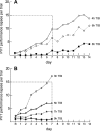Behavioral and physiological consequences of sleep restriction
- PMID: 17803017
- PMCID: PMC1978335
Behavioral and physiological consequences of sleep restriction
Abstract
Adequate sleep is essential for general healthy functioning. This paper reviews recent research on the effects of chronic sleep restriction on neurobehavioral and physiological functioning and discusses implications for health and lifestyle. Restricting sleep below an individual's optimal time in bed (TIB) can cause a range of neurobehavioral deficits, including lapses of attention, slowed working memory, reduced cognitive throughput, depressed mood, and perseveration of thought. Neurobehavioral deficits accumulate across days of partial sleep loss to levels equivalent to those found after 1 to 3 nights of total sleep loss. Recent experiments reveal that following days of chronic restriction of sleep duration below 7 hours per night, significant daytime cognitive dysfunction accumulates to levels comparable to that found after severe acute total sleep deprivation. Additionally, individual variability in neurobehavioral responses to sleep restriction appears to be stable, suggesting a trait-like (possibly genetic) differential vulnerability or compensatory changes in the neurobiological systems involved in cognition. A causal role for reduced sleep duration in adverse health outcomes remains unclear, but laboratory studies of healthy adults subjected to sleep restriction have found adverse effects on endocrine functions, metabolic and inflammatory responses, suggesting that sleep restriction produces physiological consequences that may be unhealthy.
Figures





References
-
- Rechtschaffen A, Bergmann BM, Everson CA, Kushida CA, Gilliland MA. Sleep deprivation in the rat: I. Conceptual issues. Sleep. 1989;12:1–4. - PubMed
-
- Rechtschaffen A, Bergmann BM. Sleep deprivation in the rat: an update of the 1989 paper. Sleep. 2002;25:18–24. - PubMed
-
- Dinges DF, Chugh DK. Physiologic correlates of sleep deprivation. In: Kinney JM, Tucker HN, editors. Physiology, stress, and malnutrition: Functional correlates, nutritional intervention. New York: Lippincott-Raven; 1997. pp. 1–27.
-
- Van Dongen HP, Vitellaro KM, Dinges DF. Individual differences in adult human sleep and wakefulness: leitmotif for a research agenda. Sleep. 2005;28:479–96. - PubMed
-
- Kripke DF, Garfinkel L, Wingard DL, Klauber MR, Marler MR. Mortality associated with sleep duration and insomnia. Arch Gen Psychiatr. 2002;59:131–6. - PubMed
Publication types
MeSH terms
Grants and funding
LinkOut - more resources
Full Text Sources
Other Literature Sources
Medical
